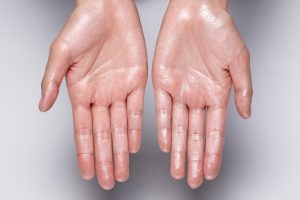Having your palms sweat as a nervous response to a stressful situation is something that most people have experienced at some point in their lives, but for some, sweaty palms (or palmar hyperhidrosis), is a chronic condition that can cause great embarrassment and interfere with their day to day existence.
Palmer hyperhidrosis affects approximately 1 and 3 percent of Americans, but researchers believe that this number is low because many are unaware that it is a medical condition and never report it to their doctor.
This condition is part of a family of disorders called primary focal hyperhidrosis, which can affect other parts of the body including the armpits, scalp and feet. These conditions are usually not caused by an underlying medical issue and are unlike secondary hyperhidrosis, which is characterized by excessive sweating that isn’t isolated to one area of the body and is usually the result of another medical problem.
While the exact cause of palmer hyperhidrosis is still unknown, many believe there is a genetic predisposition as many who have it also report a family history of the condition.
There are many treatment options for palmer hyperhidrosis, including:
- Topical aluminum chloride – One of the most common treatments for palmer hyperhidrosis. This solution is applied to the palms nightly until the condition improves and then used as needed.
- Botox injections – This has proven to be an effective treatment for many forms of localized sweating, including the palms. The treatment is FDA approved, but it can result in temporary weakness in the hands.
- Iontophoresis – A treatment that involves placing your hands in a shallow bath of water that contains a mild electrical current. This medical device can cost over $500 and may not be covered by all insurers.
- Medications – Oral prescriptions called anticholinergics are sometimes prescribed if other treatment options aren’t successful, but these medications sometimes cause uncomfortable side effects.
- Surgery – If all other measures fail, there are procedures where a surgeon can go into the chest and clip the nerves that are responsible for producing sweat. This can be a permanent solution, but only used in extreme cases.
Speak to your doctor about what type of treatment option is best for you. If you would like to schedule an appointment with a doctor at Flushing Hospital Medical Center, please call 718-670-5486.
All content of this newsletter is intended for general information purposes only and is not intended or implied to be a substitute for professional medical advice, diagnosis or treatment. Please consult a medical professional before adopting any of the suggestions on this page. You must never disregard professional medical advice or delay seeking medical treatment based upon any content of this newsletter. PROMPTLY CONSULT YOUR PHYSICIAN OR CALL 911 IF YOU BELIEVE YOU HAVE A MEDICAL EMERGENCY.










